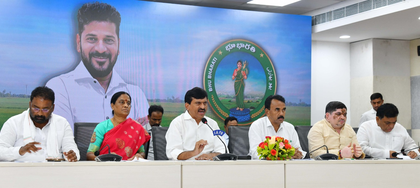Telangana to issue ordinance to scrap two-child norm for local body polls
By IANS | Updated: October 23, 2025 23:40 IST2025-10-23T23:39:30+5:302025-10-23T23:40:10+5:30
Hyderabad, Oct 23 The government of Telangana has decided to issue an ordinance to do away with the ...

Telangana to issue ordinance to scrap two-child norm for local body polls
Hyderabad, Oct 23 The government of Telangana has decided to issue an ordinance to do away with the two-child norm for contesting local body elections in the state. The decision was taken at the Cabinet meeting presided over by Chief Minister A. Revanth Reddy on Thursday.
The Cabinet approved the deletion of Section 21(3) of the Telangana Panchayat Raj Act, 2018, which bars candidates with more than two children from contesting local body elections.
Minister for Information and Public Relations P. Srinivas Reddy told mediapersons on Thursday night that since the Assembly has been prorogued, a draft ordinance will be sent to the Governor for his approval to do away with the Section.
The two-child norm was introduced in undivided Andhra Pradesh in 1994 and was continued in the Panchayat Raj Act of 2018 in Telangana.
The issue was discussed in the previous Cabinet meeting and it was decided in principle to abolish the norm.
Several states including Andhra Pradesh have already scrapped the norm.
The Cabinet decided that the government will have to move forward as per the advice of legal experts in the wake of the interim judgment of the High Court, staying the Government Order (GO) providing 42 per cent reservation for Backward Classes in the local bodies and also the judgment of the Supreme Court, which refused to interfere with the High Court order.
On conducting the local body elections, the Cabinet noted that a petition in this regard will come up for hearing on November 3. The government will move forward as per the orders of the High Court on that day.
It was decided to convene another Cabinet meeting on November 7 to discuss and decide on Backward Class reservations and local body elections.
The Cabinet decided to resume the work on Srisailam Left Bank Canal (SLBC), said to be the world's longest tunnel. It was decided to take up the remaining tunnel work with state-of-the-art drilling expertise.
It was decided to complete the SLBC project at any cost. The projects is aimed at providing water to 3.50 lakh acres through gravity and provide irrigation and drinking water to fluoride-affected areas in the joint Nalgonda district.
The Cabinet has allowed the use of advanced drilling methods instead of the tunnel boring machine used so far for tunnel excavation.
The contracting agency has come forward to complete the remaining work without any change in the estimated cost. The Cabinet has approved the assignment of the work of completing the tunnel excavation to the same contracting company.
Of the total 44 km tunnel, 35 km of tunnel excavation has been completed from both sides so far. The work was halted due to collapse of tunnel roof on February 22, killing eight workers.
The Cabinet approved the use of cutting-edge technology to dig the remaining 9 km of tunnel without disturbing the forest, environment and wildlife.
It has been decided to complete the SLBC by June 2028.
The Cabinet discussed the speedy completion of the four super specialty hospitals under construction in the state. It has directed the officials to expedite the construction of Warangal Super Specialty Hospital, LB Nagar Telangana Institute of Medical Sciences (TIMS), Sanath Nagar TIMS and Alwal TIMS.
The state Cabinet has given in-principle approval to the proposals for setting up 1500 MW battery energy storage units in the state. It has directed the Electricity Department to take an appropriate decision on where these constructions should be undertaken.
The Cabinet has approved the removal of the 52-year-old Ramagundam Thermal Station (RTS-B 62.5 MW unit) in Ramagundam as its term has expired.
The Cabinet has directed the Electricity Department to prepare a future plan in accordance with the current power requirements of the state and the power demand estimates for the next 10 years.
Disclaimer: This post has been auto-published from an agency feed without any modifications to the text and has not been reviewed by an editor
Open in app